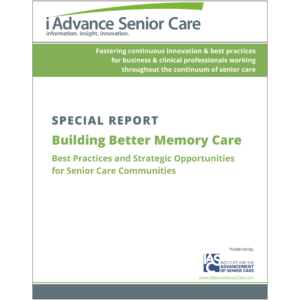Pet therapy is for the birds
Senior living providers are very familiar with therapy dogs, cats and even horses. But therapy chickens?
Most people associate chickens with rural life and the farm-to-table movement. But therapy chicken projects have been the rage in the UK during the past few years, spurring groups like HenPower. The idea started as an experiment in using chickens to help seniors overcome loneliness but became a trend once participants realized how seniors could bond with the birds.
America is seeing a resurgence of backyard hobby flocks, even in suburban and urban areas. As the opportunities grow, some senior living organizations are saying it makes sense to bring seniors and chickens together.
The adult day program at the Jewish Community Center in Cherry Hill, New Jersey, receives regular visits from Rosebud, a therapy chicken who loves to cuddle on residents’ laps. “She’s very soft, she’s very nonthreatening and most people just really enjoyed the whole feel of her,” Gwenne Baile, Rosebud’s owner, told Philadelphia’s WPVI-TV. “The stroking of her calms them.”
Raising chickens-in-residence also can jumpstart activities that engage residents on different levels. A visit from a friendly hen could inspire a chicken-themed art project, while the eggs could inspire a cooking activity.
Life Care Center of Nashoba Valley, in Littleton, Massachusetts, built its own chicken coop and has raised hens since 2013. The nursing home, which sits on 40 acres, also has a pasture full of other animals, including llamas and goats.
The chicken pen is near the building and easily visible from windows, a deliberate placement, administrators say. “The idea for the chickens is that people who have mild, mid-stage dementia to late-stage, are too agitated and distracted to sit still and do a craft project or a word game or listen to a music program,” Director Ellen Levinson explained to the Lowell Sun. “(With the animals), there’s always something to look at, and it’s life that they’re looking at.”
The females of most chicken breeds are naturally docile, motherly and quiet. Their soft feathers and gentle cooing sounds can calm agitation and improve mood. Unlike some animals, chickens tend to look people in the eye, which aids in people’s connection with the birds. Best of all, many people in their 70s and 80s probably had chickens at home when they were children, which can be a helpful memory trigger, especially for residents with cognitive decline.
“Chickens are innately engaging,” says Terry Golson, a poultry-raising expert who provided the hens for Life Care Center’s coop and spent time developing the program for its senior residents, in a Boston Globe article. “I made it tactile by passing around feathers and eggs. For some of these elderly people, it’s been years since they’ve touched an egg. For those who used to do a lot of cooking or baking, having an egg in their hand can be very evocative. For one woman who grew up in Italy, holding the egg tapped into memories of making homemade pasta.”

Pamela Tabar was editor-in-chief of I Advance Senior Care from 2013-2018. She has worked as a writer and editor for healthcare business media since 1998, including as News Editor of Healthcare Informatics. She has a master’s degree in journalism from Kent State University and a master’s degree in English from the University of York, England.
Related Articles
Topics: Activities , Articles











